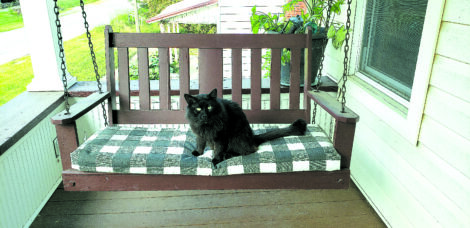Protecting your pets during dog days of summer
ST. CLAIRSVILLE — Having a pet is a big responsibility, and they rely on their people to keep them safe and healthy, including protecting them from the summer heat.
Candace Fleagane, founder of the Belmont County Cat Stray Shun organization that helps cats and kittens at the Belmont County Animal Shelter, said they best way to keep pets safe is to provide safe living quarters.
“I am a firm believer of keeping all pets indoors,” she wrote in a text message.
She noted, though, that there are steps pet owners can take to help keep their furry friends safe when they spend time outdoors.
“One important thing is when you are walking your pet, please be aware of asphalt, blacktop or concrete that may be extremely hot on the pads of their paws,” she advised. “We don’t notice it because we have shoes.”
She added that providing adequate hydration is essential as well.
“Of course keeping fresh water available for animals every day is a no brainer,” she said. “Not just giving them water, but cleaning out the water bowls every day because they become full of bacteria and scum.”
The American Society for the Prevention of Cruelty to Animals has several additional tips for keeping pets safe and healthy during the long, sunny days of summer:
Visit the vet for an early-summer checkup.
Make sure your pets have a shady place to get out of the sun, be careful not to over-exercise them and keep them indoors when it’s extremely hot.
Know the symptoms of overheating in pets, which include excessive panting or difficulty breathing, increased heart and respiratory rate, drooling, mild weakness, stupor or even collapse. Symptoms can also include seizures, bloody diarrhea and vomit along with an elevated body temperature of over 104 degrees.
Never leave your animals alone in a parked vehicle.
Do not leave pets unsupervised around a pool. If you plan on spending time near a pool, lake or beach with your pet, make sure you give them fresh water and avoid letting them drink from the pool, or ingest ocean or lake water. When swimming, introduce your pets to water gradually and make sure they wear flotation devices when on boats. Rinse your dog off after swimming to remove chlorine or salt from their fur.
Keep all unscreened windows or doors in your home closed and make sure adjustable screens are tightly secured.
Feel free to trim longer hair on your dog, but never shave your dog. The layers of dogs’ coats protect them from overheating and sunburn. Brushing cats more often than usual can prevent problems caused by excessive heat. And be sure that any sunscreen or insect repellent product you use on your pets is labeled specifically for use on animals.
Use caution when using herbicides and insecticides. When applying these products to your yard it is best to keep your pet away from the area being treated. Keep fertilizers out of reach and your pet out of the treated area until it is dry. Keep citronella candles, tiki torch products and insect coils of out pets’ reach as well.
Be mindful of what you are planting in your garden. It’s important to familiarize yourself with the plants in your yard or garden and the potential hazard they may pose to your pets.
Remember that food and drink can pose one of the biggest threats to pets. To keep them from having food that is too high in fat, or ingesting a food item that may be toxic, it’s best that your pet sticks to their normal diet and treats. Be sure to also keep the garbage out of reach, as snooping noses can find their way to hazardous items. If you’re enjoying alcoholic beverages at your festivities, be sure to keep your drinks up and away from pets and clean up any spills before they have a chance to take a taste.
Never use fireworks around pets.
If you suspect that your pet ingested something potentially toxic, call your veterinarian or the ASPCA Animal Poison Control Center at 888-426-4435 immediately.





